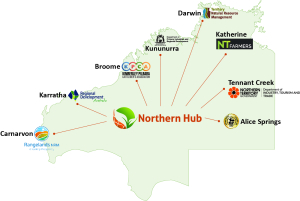In recognition of distinct regional drought challenges and resilience opportunities, the Hub partnership will work to connect research expertise with on-ground knowledge and respond to end user demands for transformative new technologies and leading practices. It will operate as a network to enhance connectivity across the region and between industries and communities. It will source and communicate relevant knowledge in response to industry and community needs and redress barriers to adoption and innovation through targeted communications. It will support and direct resources into extension programs delivered through consortium partners. 
The core consortium partners include industry bodies (Kimberly Pilbara Cattlemen’s Association, Northern Territory Cattlemen’s Association, Northern Territory Farmers Association) as well as NRM organisations (Territory NRM, WA Rangelands NRM), Regional Development Australia and government agencies (WA Department of Primary Industries and Regional Development and the NT Department of Industry Tourism and Trade).
The Hub will be structured as unincorporated joint venture, with Charles Darwin University (CDU) holding the head agreement with the Australian Government. CDU will administer the Hub Grant at the direction of an independently chaired governing board, representing consortium partners. The consortium will develop a network of wider partnerships that will include indigenous representative bodies, research institutions, private companies and community groups that will act in an advisory capacity and may advance to full membership of the hub consortium. Servicing businesses and communities across an area of approximately 3 million km2, Hub engagement and extension activities will be delivered through the regional delivery centres of consortium partners. These delivery centres will include Darwin, Katherine, Alice Springs, Carnarvon, Broome and Kununurra. The proposed preliminary scope for Hub action includes:
- Situational analysis of current programs and activities that are building rural resilience within the region
- Stakeholder engagement to capture lessons-learnt and current stakeholder knowledge and strategies for drought adaptation.
- Building business resilience across primary industries through improved financial literacy, drought response planning and diversification
- Introducing leading practices and technologies in grazing land management for healthier, more productive, and resilient rangelands.
- Strengthening water security at both property and landscape scales, by enhancing water capture, storage and retention, water use efficiency and crop/pasture
